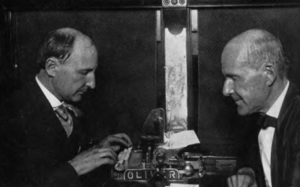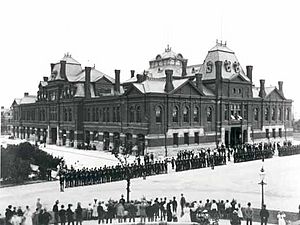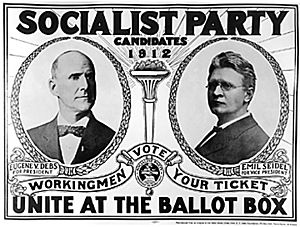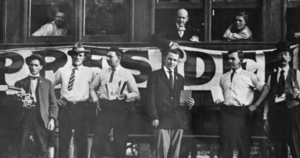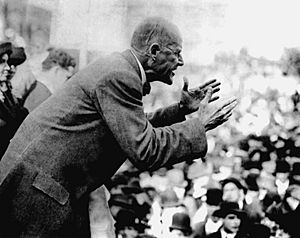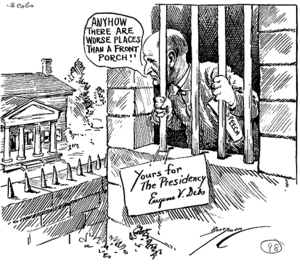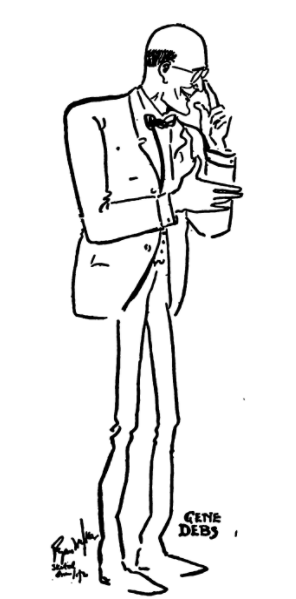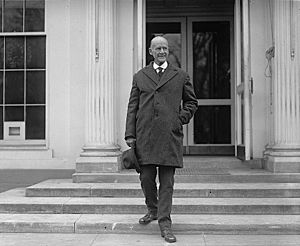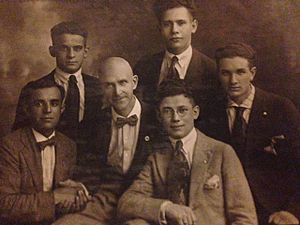Eugene V. Debs facts for kids
Quick facts for kids
Eugene V. Debs
|
|
|---|---|
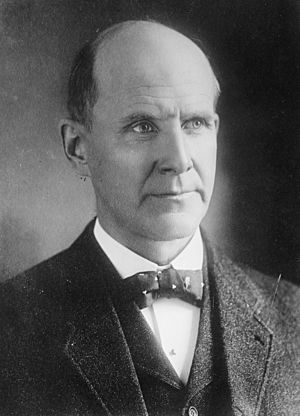
Debs, c. 1912
|
|
| Member of the Indiana House of Representatives from the 17th district |
|
| In office January 8, 1885 – January 6, 1887 Serving with Reuben Butz
|
|
| City Clerk of Terre Haute, Indiana | |
| In office 1879–1883 |
|
| Personal details | |
| Born |
Eugene Victor Debs
November 5, 1855 Terre Haute, Indiana, U.S. |
| Died | October 20, 1926 (aged 70) Elmhurst, Illinois, U.S. |
| Resting place | Highland Lawn Cemetery |
| Political party |
|
| Spouse |
Kate Metzel
(m. 1885) |
| Relatives | Theodore Debs (brother) |
| Signature | |
Eugene Victor Debs (born November 5, 1855 – died October 20, 1926) was an American socialist and a strong voice for workers' rights. He was a political activist and a leader in forming trade unions. These groups helped workers get fair pay and better conditions.
Debs was one of the people who started the Industrial Workers of the World (IWW). He also ran for President of the United States five times as the candidate for the Socialist Party of America. Because of his presidential campaigns and his work with labor movements, Debs became one of the most famous socialists in the United States.
Early in his career, Debs was part of the Democratic Party. He was elected to the Indiana General Assembly in 1884. After working with smaller unions, Debs helped create the American Railway Union (ARU). This was one of the first "industrial unions," meaning it included all workers in an industry, not just those with specific skills.
In 1894, Debs led a big strike called the Pullman Strike. This strike involved railway workers across many states. He was later sent to prison for six months because he went against a court order during the strike. While in prison, Debs read books about socialist ideas. He came out of jail believing strongly in the international socialist movement.
Debs helped start several socialist parties, including the Socialist Party of America in 1901. He ran for president in 1900, 1904, 1908, 1912, and 1920. In 1920, he even ran for president while he was in prison!
Debs was known for his powerful speeches. One speech against the United States joining World War I led to his arrest in 1918. He was found guilty under a law called the Sedition Act of 1918 and sentenced to ten years in prison. President Warren G. Harding later reduced his sentence in December 1921. Debs passed away in 1926 due to heart problems that began during his time in prison.
Contents
Early Life and Work
Growing Up in Indiana
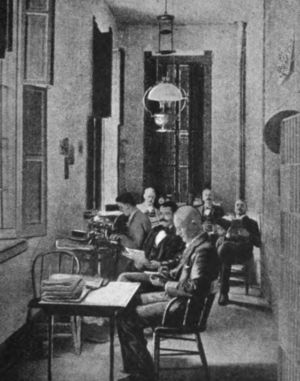
Eugene Victor "Gene" Debs was born on November 5, 1855, in Terre Haute, Indiana. His parents, Jean Daniel and Marguerite Mari Bettrich Debs, had moved to the United States from France. His father came from a wealthy family and owned a textile mill. Eugene was named after famous French writers.
Debs went to public school but left high school when he was 14. He started working for the Vandalia Railroad. His first job was cleaning grease from the wheels of freight engines for fifty cents a day. Later, he became a painter and car cleaner in the railroad shops. In 1871, he became a night fireman on a train, earning more than a dollar a night. He did this for three and a half years.
In 1875, Debs left the railroad to work at a grocery store. He stayed there for four years while also going to a business school at night.
Joining the Firemen's Union
Debs joined the Brotherhood of Locomotive Firemen (BLF) in February 1875. He quickly became very active in the group. In 1877, he represented his local group at the BLF's national meeting. He was chosen to be an editor for the BLF's magazine, Firemen's Magazine, in 1878. Two years later, in 1880, he became the main secretary and treasurer of the BLF and the chief editor of the magazine. He worked for the BLF until 1893 and edited the magazine until 1894.
At the same time, he became a well-known person in his community. He served two terms as the city clerk of Terre Haute from 1879 to 1883. In 1884, he was elected as a Democrat to represent Terre Haute and Vigo County in the Indiana General Assembly. He served one term in 1885.
Family Life
Debs married Katherine "Kate" Metzel on June 9, 1885. Their home in Terre Haute is still standing today. It is now a preserved historic site on the campus of Indiana State University.
Leading Labor Movements
From Brotherhood to Industrial Union
The early railroad brotherhoods were focused on helping members and providing services. They were not focused on collective bargaining, which is when workers negotiate together for better pay and conditions. Their motto was "Benevolence, Sobriety, and Industry." As an editor for the Brotherhood of Locomotive Firemen, Debs first worked on improving insurance plans for death and injury.
In the early 1880s, Debs wrote about self-improvement, like being sober, working hard, and being honest. He also believed that "labor and capital are friends," meaning workers and business owners should get along. He was against strikes as a way to solve problems. The brotherhood had never gone on strike from 1873 to 1887, and Debs was proud of this.
However, Debs slowly realized that a more united and strong approach was needed. Railroad companies were very powerful. One event that changed his mind was the Burlington Railroad Strike of 1888. This strike was a loss for the workers. It convinced Debs that unions needed to include workers from all different jobs, not just specific crafts.
After leaving his role as Brotherhood Grand Secretary in 1893, Debs helped create one of the first industrial unions in the United States. This was the American Railway Union (ARU), which included all types of railroad workers, even those without special skills. He was elected president of the ARU. The union had a successful strike against the Great Northern Railway in 1894, winning most of their demands.
The Pullman Strike
In 1894, Debs became involved in the Pullman Strike. This strike started because the Pullman Palace Car Company cut its workers' wages by 28 percent. Many of these workers were already part of the ARU. They asked the union for help.
Debs tried to warn union members that a boycott was too risky. He worried about the power of the railroads and the government, and that other unions might not support them. But the union members ignored his warnings. They refused to handle Pullman cars or any other cars attached to them, including cars carrying U.S. Mail.
The strike grew very large, involving tens of thousands of workers. On July 9, 1894, a newspaper called Debs "a lawbreaker at large, an enemy of the human race." The strike became known as "Debs' Rebellion."
The federal government stepped in. They got a court order against the strike, saying that the strikers were stopping the U.S. Mail. President Grover Cleveland sent the United States Army to end the strike. The army's presence helped break the strike. Many strikers were killed, and thousands lost their jobs. Debs was found guilty of going against the court order and was sent to federal prison.
His lawyer was Clarence Darrow, who later became a famous lawyer. The Supreme Court later said that the government had the right to issue such court orders.
Becoming a Socialist Leader
Discovering Socialism in Prison
When Debs was arrested for stopping the mail, he was not yet a socialist. While he was serving his six-month sentence in jail in Woodstock, Illinois, Debs and his ARU friends received many letters, books, and pamphlets from socialists across the country.
A socialist newspaper editor named Victor L. Berger visited Debs in jail. Debs later said that Berger "delivered the first impassioned message of Socialism I had ever heard." It was said that Berger left him a copy of a book called Das Kapital. Debs read it slowly and eagerly. When he left jail, he was a changed man. He spent the rest of his life promoting the socialist cause.
After Debs was released from prison in 1895, he began his socialist political career. He started encouraging ARU members to form a Social Democratic group. In 1896, Debs supported Democratic candidate William Jennings Bryan for president. After Bryan lost, Debs became sure that socialist ideas needed a new political party, separate from the Democratic Party. In June 1897, the ARU members joined with another group to form the Social Democracy of America.
Debs's wife, Kate, was not in favor of socialism. She felt it threatened their middle-class life.
Forming the Socialist Party
The Social Democracy of America (SDA) was divided. Some members wanted to create socialist communities as examples. Others wanted to form a political party to win elections and change the government.
In June 1898, the group had its last meeting. The members who wanted political action left to form a new group, the Social Democratic Party of America (SDP). Debs was elected to the party's main committee. His brother, Theodore Debs, became the paid executive secretary. Debs was not the only decision-maker, but his fame from the Pullman strike made him the public face of the party.
Running for President
In 1900, Debs was the first candidate for federal office for the new socialist party. He ran for president but did not win. He and his running mate received 87,945 votes, which was 0.6 percent of the total votes.
After the 1900 election, the Social Democratic Party joined with other socialist groups. In 1901, they formed the Socialist Party of America (SPA).
Debs ran for president as the Socialist Party candidate four more times: in 1904, 1908, 1912, and 1920. In 1920, he ran while he was in prison. He never won any electoral votes. However, he received more popular votes in each election. In 1912, he received 901,551 votes, which was 6.0 percent of the popular vote. This is still the highest percentage for a Socialist Party candidate in a U.S. presidential election.
Even though he had some success as a third-party candidate, Debs did not fully trust the election process. He believed it was more important to organize workers into unions. He preferred unions that brought all workers in an industry together, rather than just those with specific skills.
Starting the Industrial Workers of the World
After his work with the Brotherhood of Locomotive Firemen and the American Railway Union, Debs helped start another important labor union. This was the Industrial Workers of the World (IWW). On June 27, 1905, in Chicago, Illinois, Debs and other union leaders met. One leader called it the "Continental Congress of the working class." They wanted to unite workers across the country to improve their lives.
Differences with the IWW
Even though the IWW aimed to unite workers, differences grew between the union and the Socialist Party. Some Socialist Party leaders were bothered by speeches from IWW leaders. They felt the IWW was too extreme.
This disagreement caused a split between the IWW and the Socialist Party. Debs was important to both groups, which made the situation difficult for him. The final break happened during the Lawrence Textile Strike. An IWW leader criticized elected officials for sending police to use force on children. He said he would not vote again until such things stopped. This led to him being removed from the Socialist Party's main committee.
Debs supported the Socialist Party's decision, even though he had been friends with the IWW leader. Before this split, the Socialist Party had its highest number of members. After the split, membership dropped.
Speaking Out and Imprisonment
Against World War I
Debs spoke out against President Woodrow Wilson and the United States joining World War I. President Wilson called Debs a "traitor to his country." On June 16, 1918, Debs gave a speech in Canton, Ohio. In his speech, he encouraged people to resist the military draft. He was arrested on June 30 and charged with ten counts of going against the government.
At his trial, Debs was allowed to speak in his own defense for two hours. He was found guilty on September 12. At his sentencing on September 14, he gave another powerful speech. He was sentenced to ten years in prison and lost his right to vote for life.
Debs appealed his conviction to the Supreme Court. The Court looked at his statements about World War I and socialism. Even though Debs had tried to be careful with his words, the Court found that his speeches intended to stop the draft and military recruitment. The Court said his case was similar to another case where a conviction was upheld.
Debs went to prison on April 13, 1919. In protest of his jailing, a parade of union members and socialists took place in Cleveland, Ohio, on May 1. This event turned into the violent May Day riots of 1919.
While in the Atlanta Federal Penitentiary, Debs ran for president in the 1920 election. He received 919,799 votes, which was 3.4 percent of the total votes. This is still the highest number of votes for a Socialist Party candidate in a U.S. presidential election. While in prison, Debs wrote articles criticizing the prison system. These were later published in his only book, Walls and Bars.
President Wilson refused to pardon Debs, saying Debs was a "traitor to his country."
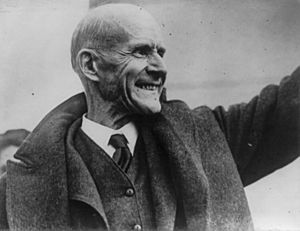
On December 23, 1921, President Warren G. Harding reduced Debs's sentence. He was released on Christmas Day.
Final Years
When Debs was released from prison, the other prisoners cheered loudly. A crowd of fifty thousand people greeted him when he returned to Terre Haute. On his way home, Debs met President Harding at the White House. Harding greeted him warmly.
In 1924, Debs was nominated for the Nobel Peace Prize. He was nominated because he worked for peace during World War I, believing the war was mainly for business interests.
Debs spent his last years trying to get his health back. His time in prison had made him very sick. In late 1926, he went to a special hospital in Elmhurst, Illinois. He passed away there from heart failure on October 20, 1926, at age 70. His body was cremated and buried in Highland Lawn Cemetery in Terre Haute, Indiana.
Debs's Legacy
Eugene Debs helped inspire people on the American left to stand up against large corporations and World War I. Socialists, communists, and anarchists in America honor his work for the labor movement. They also admire his efforts to help working people build a better society without too much government involvement. Many books have been written about his inspiring life as an American socialist.
Bernie Sanders, a senator from Vermont and a presidential candidate, has long admired Debs. In 1979, he made a documentary about Debs. Sanders has a portrait of Debs in his office. He has called Debs "probably the most effective and popular leader that the American working class has ever had."
On May 22, 1962, Debs's home was bought by the Eugene V. Debs Foundation. They wanted to keep it as a memorial to him. In 1965, it became an official historic site in Indiana. In 1966, it was named a National Historic Landmark of the United States. The National Park Service helps watch over the museum. In 1990, the Department of Labor added Debs to its Labor Hall of Fame.
While Debs did not leave his papers to a university, the collection of pamphlets he and his brother gathered is at Indiana State University. The original handwritten book Walls and Bars is at the University of Chicago Library.
Some places have been named after Debs, including Eugene Township and the community of Debs in Minnesota. A former radio station in New York, WEVD, was named in his honor. Debs Place, a housing block in Co-op City in the Bronx, New York, is also named after him. There are even beers named after Debs!
Images for kids
See Also
 In Spanish: Eugene V. Debs para niños
In Spanish: Eugene V. Debs para niños
- List of civil rights leaders
- List of people pardoned or granted clemency by the president of the United States


